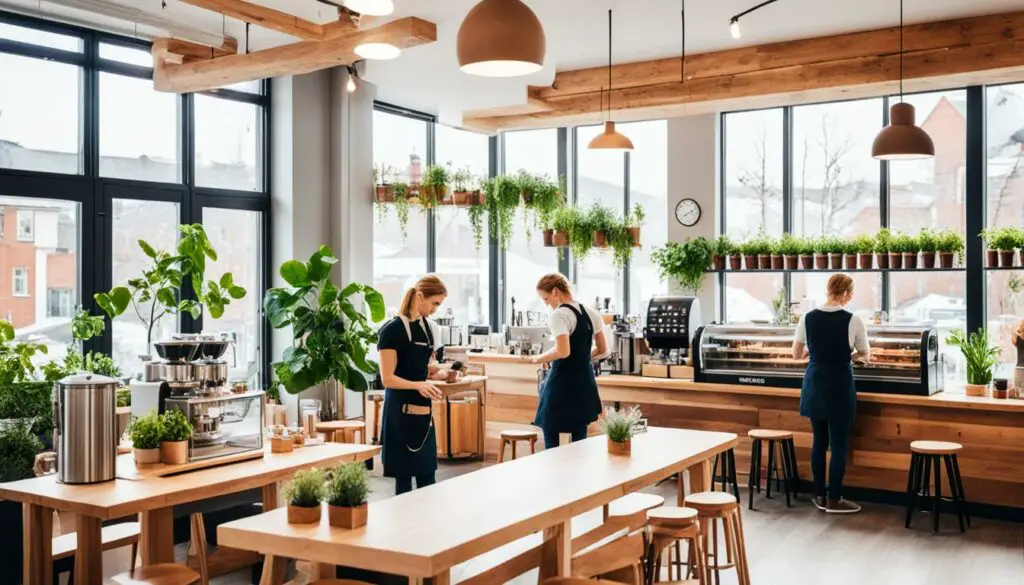Coffee is one of the most popular drinks in the world, (roughly 1.4 billion cups are drank per day worldwide) though many who drink it probably don’t know about its associated health benefits.

Research indicates that drinking 3-4 cups of coffee a day helps lower the risk of various health problems especially those linked to cancerous diseases as well as, gallstones, liver cirrhosis, Parkinson’s, Alzheimer’s disease, and more.
Coffee has a high level of antioxidants that help fight off and protect your cells from free radicals. Free radicals are molecules that are created when the body breaks down food or is exposed to tobacco smoke or radiation. Antioxidants are said to help neutralize free radicals in our bodies and boost overall health.
Coffee Contains Essential Nutrients
Many of the nutrients in coffee beans make their way into the finished brewed coffee.
One cup of coffee contains:
- Riboflavin (vitamin B2): 11% of the Reference Daily Intake (RDI).
- Pantothenic acid (vitamin B5): 6% of the RDI.
- Manganese and potassium: 3% of the RDI.
- Magnesium and niacin (vitamin B3): 2% of the RDI.
Although this may not seem like much, this can quickly add up if you are a coffee lover who consumes several cups of coffee each day.
What are the associated health benefits of drinking coffee
- Studies show that coffee drinkers have a much lower risk of developing type two diabetes.
- Coffee drinkers also have a much lower risk of getting Alzheimers, Parkinsons’ and other neurodegenerative diseases for which there is no cure. Caffeine appears to be an essential chemical in preventing these diseases, as decaf coffee drinkers did not experience the same prevention benefits.
- Coffee may also reduce the risk of cirrhosis and other liver-related diseases.
- Harvard School of Public Health conducted research that discovered women who drink 4 or more cups of coffee are 20% less likely to fall into depression. It appears coffee can reduce the risk of developing depression as well as death by suicide.
- Coffee drinkers also have a reduced chance of developing liver and colorectal cancer.
- It has been incorrectly stated in the past that caffeine can increase the risk of developing heart disease. Not only is this false, but coffee drinkers are also less likely to suffer from strokes.
- Overall, studies show that coffee drinkers are likely to live longer and are at a lower risk of dying prematurely.
Boosts workplace participation
Studies also show consuming coffee can increase positive interaction between co-workers and improve mood and productivity. It has been credited for increased group participation in the workplace.
Boost body energy and improves thinking
Coffee is a stimulant that provides your body with instantaneous energy. This makes you feel less tired. This stimulant is called caffeine, the most commonly consumed psychoactive substance in the world.
When you drink coffee, caffeine is absorbed into the bloodstream and travels to the brain. Caffeine blocks an inhibitory neurotransmitter in your brain, which enhances the firing of neutrons and stimulates the mind. Caffeine stimulates neurotransmitters in the brain, including noradrenaline, dopamine, and serotonin, which improves your mood.
Studies show that caffeine improves several aspects of brain function, including memory, mood, vigilance, energy levels, reaction times, and general mental function.
Improves workout
A cup of black coffee half an hour before your workout can significantly boost performance. Increased adrenaline levels in your blood prepare you for active prolonged physical exercise. Furthermore, Caffeine breaks down body fat, making free fatty acids available as fuel.
Helps with weight loss
Coffee has potassium and magnesium, which supplement the body with insulin. Insulin helps your body regulate sugar levels and control your sugar appetite. It also helps burn your fat as body fat is broken down, assisting weight loss.
Tip: if you are a coffee lover who is trying to lose weight, we recommend substituting sugar in your coffee for honey, sweeteners, or just cutting it out altogether. Make sure you have some high-quality coffee beans that have not been pre-roasted, to avoid a burnt flavor in your coffee. Improving the flavor of your coffee will help you cut out sugary additives.
Where do coffee beans come from?
The coffee bean isn’t really a bean at all. It is actually a seed that grows in the center of a red fruit known as a coffee cherry. These grow on Coffee plants which can take up to four years before they are ripe enough to harvest.
Read more about the best advice on coffee beans

The coffee cherries are harvested by hand once they turn red and ripen. This process is labor-intensive and time-consuming. However, some larger coffee farms have developed mechanized processes to harvest the crop.
Two types of coffee plants are grown. These are Robusta and Arabica, which produce different flavored beans and vary in intensity.
Some coffee farms may use synthetic fertilizers, pesticides, herbicides, fungicides, and insecticides, which harm the environment and the farmers growing the coffee. If you want to avoid coffee that has been exposed to pesticides, then you can opt for some chemical-free alternatives, such as coffee that has been grown using traditional farming methods. This includes most coffee beans grown in Yemen or Ethiopia.
Alternatively, you could buy certified organic coffee or coffee that is labeled “sustainable,” which is easy enough to find online. It should be noted, however, that chemicals used in the growing process are unlikely to make their way into your cup of coffee.
This is because coffee is not consumed raw like fruit and vegetables. The flesh of the coffee cherry is discarded and only the seeds are used. These are soaked, fermented, and subjected to a thorough drying process before being roasted at temperatures exceeding 400°F and finally being broken down in near-boiling water to produce an exceptional brew. It is therefore unlikely that the small amounts of pesticides permitted by law will end up in your cup of coffee. That being said, we always recommend sourcing high-quality coffee beans from reputable producers and brands. Apart from looking out for your health, you want your coffee to taste exceptional.
Healthier Coffee Drinking Habits
Tip 1: Not ideal before asleep
Avoid drinking coffee before bed. The caffeine in your coffee is a stimulant for brain function, and activity and produces adrenaline in your body, which will cause you to be more alert and prevent sleep. Sleep is absolutely essential for good health and productivity during the day, so if you want a hot beverage late at night, we suggest some camomile tea.
Tip 2: The addiction
If you consider yourself a bit of a coffee addict, you might want to be aware of any additives in your coffee. Too much sugar and syrup in your coffee can lead to various health problems down the line, such as diabetes, and obesity. Try to substitute these for a teaspoon of honey or sweeteners, or better yet, eliminate sugar from your coffee habits altogether.
Besides, moderate coffee intake is healthy. Excessive coffee intake can also cause dehydration and jitters. Moreover, a high intake of brewed coffee contains diterpene and cafestol, which could increase cholesterol levels in your body.
Always listen to what your body is telling you. Everyone reacts differently to different chemicals in their body. if you are experiencing jitters or dehydration reduce your coffee intake. Find the right balance between the risks and the benefits.
Tip 3: A cup a day keeps the doctor away
A cup or two a day is enough to provide you with the health benefits your body requires. Remember not to overdo it. If you are drinking like 16 cups a day, we suggest you slow your roll to avoid obsession.
Tip 4: Become a pro homebrewer
Instead of running out to your local coffee shop every time you want a professional cup of joe, source fresh coffee beans and become a pro brewer yourself. Fresh coffee beans, a coffee grinder, and a coffee maker is all you need to produce perfect coffee every time.
Make sure you use fresh beans and avoid pre-roasted beans. Only grind them when you are ready for your next cup and keep them sealed in an airtight bag to prevent oxidation that can diminish their rich flavor and reduce its antioxidants.
For more information on how to get started check out our other blogs:
2. Choosing the best coffee grinder
Tip 5: Don’t drink coffee after dinner.
Have you ever been offered a cup of coffee at the end of your meal while dining out? Drinking coffee after a meal can interfere with iron absorption which is crucial for our bodies to produce healthy red blood cells and transport oxygen. So, stick to drinking coffee for breakfast.
Find out more about the best time to drink coffee
Tip 6: Experiment with favor
If you like experimenting with coffee and blending flavors, you might enjoy mixing in some light spices like cinnamon. This spice blends beautifully with coffee and produces great-tasting brews. Cinnamon helps lower body cholesterol, triglycerides, and blood glucose are problems linked to diabetes. But enjoy this spice in moderation.
You could also add Cocoa to increase the antioxidants in your cup. This helps reduce the risk of heart diseases and many other potential ailments.
Tip 7: Enjoy every sip
Responsible coffee intake is not only nutritious but also fun. A perfectly brewed delicious serving is something you should look forward to every day.












